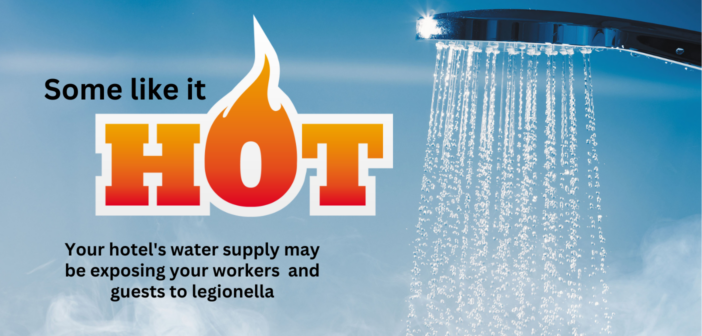Is your hotel’s water supply exposing your workers and guests to legionella?
While nobody wants to run out of hot water, hoteliers have an even higher obligation to provide a safe guest experience. To address both concerns, with today’s tankless water heaters, hotels can have all the hot water desired, while saving energy and helping combat legionella – the pathogen that causes Legionnaires’ disease. And, aside from the basic responsibility hotel owners bear for guest and worker safety, properties open themselves up to the prospect of lawsuits if they haven’t taken adequate steps to ensure their hotels aren’t a breeding ground for bacteria of any kind.
Legionella is a resilient organism that lives and breeds in temperatures between 68° and 122° F. In temperatures below 68°, it goes dormant but doesn’t necessarily die. It can survive at 122° for eight hours and won’t instantly die until temperatures reach 176° degrees. So, it can live and thrive in many stratified hot water storage tanks.
There are three primary conditions required for legionella growth:
1. WATER TEMPERATURE
 Hot water storage tanks typically are stratified by temperature, some of which is inhospitable to legionella. But, there are pockets of temperature that are friendly to the organism.
Hot water storage tanks typically are stratified by temperature, some of which is inhospitable to legionella. But, there are pockets of temperature that are friendly to the organism.
Depending on the facility or application, the required hot water temperatures will differ. A sink in a hotel room might be limited to 120°, while the hotel’s laundry facility and restaurants might need 130° or higher. Engineers often solve this issue with mixing valves, but they’re expensive mechanical devices that are prone to problems that can lead to temperature fluctuations. Additionally, mixing valves interferes with system equilibrium and may create risky pockets of stagnant water due to oversized piping, dead piping, or poorly balanced systems.
2. WATER QUALITY AND MOVEMENT
 Water quality in a storage tank rarely is uniform either, with sediment accumulating at the bottom of the tank. This sediment acts as food and insulator for micro-organisms, and it can be stirred up by a water hammer or nearby fire hydrant use. This creates an environment favorable for legionella.
Water quality in a storage tank rarely is uniform either, with sediment accumulating at the bottom of the tank. This sediment acts as food and insulator for micro-organisms, and it can be stirred up by a water hammer or nearby fire hydrant use. This creates an environment favorable for legionella.
Additionally, many hotel hot water systems are redundant and oversized to address peak-demand situations. It’s this stored (stagnant) water that invites legionella. Beyond legionella, oversized hot-water systems also create efficiency and maintenance problems.
3. BIOFILM
 Biofilm is a polymeric solution that is excreted from certain organisms. It forms a protective and adherent substrate, is a great insulator, and also is a food source, making it a popular breeding ground for bacteria. Legionella doesn’t produce biofilm directly, but it does feed on it.
Biofilm is a polymeric solution that is excreted from certain organisms. It forms a protective and adherent substrate, is a great insulator, and also is a food source, making it a popular breeding ground for bacteria. Legionella doesn’t produce biofilm directly, but it does feed on it.
REDUCE RISK
To prevent Legionnaires’ disease, it’s imperative to reduce the risk of legionella growth and transmission in water systems. This can be achieved by making sure building water systems are clean and well-maintained, while inspecting water regularly for legionella bacteria.
While tankless water heating technology doesn’t eliminate legionella risk, it does significantly mitigate it by creating a less hospitable environment for the pathogen in multiple ways:
- Bacteria, sediment, and biofilm risks are minimized due to no storage of water. Reducing or eliminating these impurities is key to success.
- Tankless units maintain a consistent output water temperature without additional controls, eliminating mechanical points of failure found in mixing valves. This consistent water temperature eliminates the stratification of water with its resulting pockets of attractive temperatures for legionella. Creating temperatures that are inhospitable to legionella is key to removing its risk.
- Finally, tankless units use advanced flow control, which keeps the water moving, making it inhospitable to legionella.
Ultimately, hotels must be vigilant to the importance of mitigating legionella risks – from a standpoint of protecting guests and workers, while also shielding themselves from legal action should anyone get sick from inadequate on-property practices. Plus, the additional benefits – endless hot water and energy savings – provide a healthy incentive for hoteliers to better monitor their water-usage practices and procedures.





